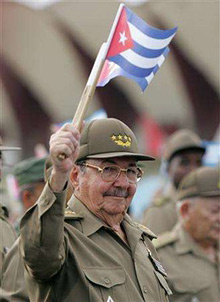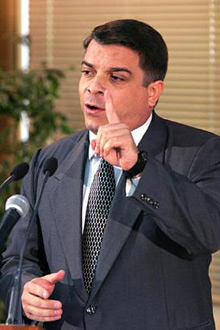 |
 |
 |
 Editorials | At Issue | January 2006 Editorials | At Issue | January 2006  
Cuba Begins to Think About Life After Castro
 Marc Frank - Financial Times Marc Frank - Financial Times


| | Cuban Defense Minister Raul Castro | 
| | Foreign Minister, Felipe Pérez Roque |
With the Cuban revolution passing its 47th anniversary at the weekend and Fidel Castro heading towards his 80th birthday, Havana and Washington have begun jousting in earnest in advance of what will surely be one of the most difficult moments in the island’s history – the iconic leader’s incapacitation or death.

Mr Castro’s younger brother and defence minister, Raul, 74, as first vice-president and second secretary of the communist party, is constitutionally in line to succeed. But that could be a stop-gap solution given Raul’s age and one that Cuban-Americans in the US, the Bush administration and the government’s internal opponents consider unacceptable.

Condoleezza Rice, the US secretary of state, reconvened Washington’s Commission for Assistance to a Free Cuba last month, “to develop a concise but flexible strategic plan that will help the Cuban people move rapidly toward free and fair democratic elections . . . and be ready to support Cuba when the inevitable opportunity for genuine change arises.”

The cabinet-level commission had already put together a 450-page plan to tighten sanctions and increase support for the Castro brothers’ opponents during Mr Bush’s first term, and last year a transition co-ordinator was appointed to carry out its recommendations.

“US policy must be targeted at undermining this succession strategy,” the transition report says of plans for Raul to take over.

However, Cuba, with the support of Venezuela and China, is now emerging from a 15-year crisis. Havana claimed 11.8 per cent economic growth last year and raised this year’s budget by 32 per cent. It is also being increasingly welcomed by ever more independent-minded and left-leaning governments in the Caribbean and Latin America.

Cuba’s leaders have seized the opportunity to talk openly about and prepare for the future by shoring up military defences, increasing control over the economy and launching a youth-led drive against corruption, pilfering, waste and “ideological and political weaknesses”.

The National Assembly of People’s Power, a rubber-stamp parliament that includes the country’s national and provincial leaders, held a remarkable end-of-the-year session that for the first time was open to diplomats and foreign journalists and dealt extensively, if delicately, with the inevitable.

“In the Soviet Union, errors led to popular discontent among other reasons due to the bad performance of the economy,” Francisco Soberon, chairman of the central bank who has emerged as Mr Castro’s closest economic adviser, told the assembly.

“To the extent that we do not achieve a steady improvement in people’s standard of living and sustainable development we risk that these formidable personalities [Fidel and Raul Castro] become the only pillar on which our system rests,” Mr Soberon, said.

But the most extraordinary moment came when Felipe Pérez Roque, the foreign minister and a Castro protégé, took the leader’s place to deliver the closing speech. It was a broad-ranging discourse and optimistic review of the international and domestic situation, highlighting the need to prepare ideologically and politically for Mr Castro’s passing and new US efforts to “annex” the country.

“We have to preserve the victorious revolution in the future when there is void no one can fill . . . and so one of the profound themes of this assembly’s organisers was that the enemy has put its hopes not in defeating us now, but after,” said Mr Roque, who is considered the leading voice of an up and coming generation of 40- to 60-year-olds that dominate the provincial Communist and government organisations and, increasingly, the military and security apparatus.

“Now we have the generation that made the revolution . . . even the enemy knows with them there will be no deals, but it is placing its hopes in the idea that it will be able to confuse, divide, buy or intimidate those who follow,” he said.

Mr Roque received a standing ovation and one of Cuba’s most powerful figures, assembly president Ricardo Alarcon, urged people to study his “brilliant” remarks. One could almost hear future chants of “Felipe, Felipe” instead of “Fidel, Fidel.” | 
 | |
 |



